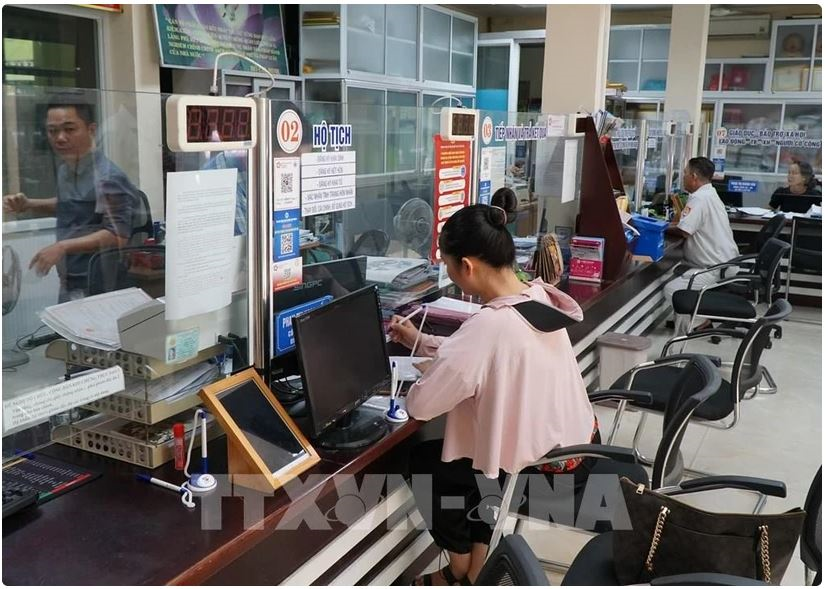-
 Covid-19 speeds up digital transformation, highlights policy needs10/09/2021According to the World Bank (WB), Vietnam is positioned well to join the global digital race but progress requires focused and proactive government policies to realize its ambitions.
Covid-19 speeds up digital transformation, highlights policy needs10/09/2021According to the World Bank (WB), Vietnam is positioned well to join the global digital race but progress requires focused and proactive government policies to realize its ambitions.
In an August 2021 report, the WB said the rate of people using mobile phones is high and on the increase. More and more Vietnamese people are also connected to the internet. The presence of some of the world's leading information technology corporations in Vietnam such as Samsung, Apple and Intel also provides a significant opportunity for Vietnamese workers to improve their digital skills and participate in Vietnam’s expanding digital economy.
However, the WB report noted that Vietnam's workforce lacks necessary skills to fully master the digital economy with only 40 percent of enterprises reporting that they have sufficient information and communication technology skills to maintain and fully exploit digital technology systems.

The report’s authors therefore urged policymakers to encourage businesses and workers to acquire the right skills to take advantage of the digitalization transformation, nurture innovative capacity among firms through competition and financial support to local startups and talents, and promote information access, quality, and security.
The digital economy can only develop in parallel with cyber security. According to the Global Cybersecurity Index (GCI), Vietnam has a fairly good level of protection, ranking 25th out of 194 countries and territories worldwide, seventh in the Asia-Pacific region and fourth among ASEAN countries.
The Covid-19 pandemic has provided a strong push for acceleration of Vietnam's digital transformation both in state administration and business. The number of online public services increased tenfold, from 169 in March 2020 to over 1,900 services in October 2020. In particular, more than 2,000 services have been standardized and integrated into the National Public Service Portal, from driver's license issuance to tax registration and business registration, leading to a tenfold increase in applications and transactions from January 2020 to February 2021.

Covid-19 is accelerating the business sector’s digital transformation
Upgrading infrastructure, skills
Meanwhile, Vietnamese businesses have embraced information and communication technology to facilitate remote working and approach customers despite social distancing and travel restrictions due to Covid-19. A recent telephone survey by the WB showed that the rate of enterprises using digital platforms, e-commerce sites, and social networks increased sharply in response to the Covid-19 pandemic, from 48 percent in June 2020 to 73 percent in January 2021. Meanwhile, the rate of enterprises investing in digital solutions also surged by more than four times from five percent to 21 percent in the same period.
As the world recovers from the Covid-19 crisis, it is clear that digital transformation will play an increasingly important role in the global economy, said WB Lead Economist and Program Leader for Vietnam Jacques Morisset. The Vietnamese government has clearly expressed its desire to join the digital race by setting digital transformation as one of the key goals in the Socioeconomic Development Strategy for the 2021-2030 period.
However, in order to derive more benefits from the digital transformation of the economy, Jacques Morisset said that the Vietnamese government must upgrade infrastructure, encourage the application of digital technology and attract investment to facilitate participation of small businesses in the digital economy, develop digital skills, and foster innovation capacity.
The WB recommends that the government subsidize more digital skills training for employees by strengthening information technology education and training at all levels, especially through the system of technical and vocational schools. In addition, the government needs to adopt encouraging policies on creative innovation among big enterprises as well as incentivize small businesses and startups to participate in the field.
According to the National Digital Transformation Program approved by the Prime Minister, Vietnam strives to be a member of the group of 70 leading countries in e-Government (EGDI) by 2025. Also on its list of goals is to have the digital economy account for 20% of GDP, for the proportion of the digital economy in each sector or field to reach at least 10 percent and for annual labor productivity to increase at least by seven percent.
Nguồn: VEN
-
 Vietnam harnesses AI to transform public services27/03/2025The Government is accelerating AI application to reduce the paper workload and improve operation efficacy.
Vietnam harnesses AI to transform public services27/03/2025The Government is accelerating AI application to reduce the paper workload and improve operation efficacy. -
 Government steering committee set up to drive Vietnam’s sci-tech, innovation development18/03/2025It is tasked with studying and proposing the Government and the PM national strategies, policies, and solutions for developing science, technology, innovation and digital transformation. Besides, it is in charge of overseeing the implementation of project No. 06 on developing the application of population data, identification, and e-authentication data, as well as administrative reform efforts.
Government steering committee set up to drive Vietnam’s sci-tech, innovation development18/03/2025It is tasked with studying and proposing the Government and the PM national strategies, policies, and solutions for developing science, technology, innovation and digital transformation. Besides, it is in charge of overseeing the implementation of project No. 06 on developing the application of population data, identification, and e-authentication data, as well as administrative reform efforts. -
 Innovation – breakthrough path for Vietnam’s development: experts10/03/2025Experts in Singapore believe that innovation represents a breakthrough path for Vietnam, which is advancing to the new era - that of the nation's rise.
Innovation – breakthrough path for Vietnam’s development: experts10/03/2025Experts in Singapore believe that innovation represents a breakthrough path for Vietnam, which is advancing to the new era - that of the nation's rise. -
 Decisively cutting administrative procedures to facilitate businesses’ operations06/03/2025During a recent working session with representatives of the Party Central Committee’s Commission for Policies and Strategies, Party General Secretary To Lam urged greater efforts to position Vietnam's investment environment among the top three in ASEAN within the next two to three years.
Decisively cutting administrative procedures to facilitate businesses’ operations06/03/2025During a recent working session with representatives of the Party Central Committee’s Commission for Policies and Strategies, Party General Secretary To Lam urged greater efforts to position Vietnam's investment environment among the top three in ASEAN within the next two to three years. -
 Vietnam urged to seize digital transformation opportunities21/02/2025Experts highlighted a young population, the Government's support, and a thriving startup ecosystem are driving the country’s innovation.
Vietnam urged to seize digital transformation opportunities21/02/2025Experts highlighted a young population, the Government's support, and a thriving startup ecosystem are driving the country’s innovation.


